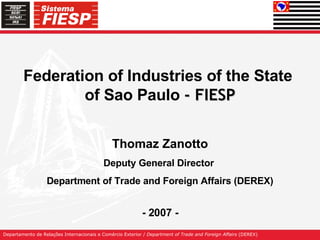ApresentaçãO Estudantes Chile 06.08.2007 [Ing.]
- 1. Federation of Industries of the State of Sao Paulo - FIESP Thomaz Zanotto Deputy General Director Department of Trade and Foreign Affairs (DEREX) - 2007 -
- 2. Representative Structure of the Brazilian Industry Sectorial Associations FIESP â Federation of Industries of the State of SĂŁo Paulo CNI â National Confederation of Industries
- 3. FIESP: Represents 132 state and national sectoral associations. SESI: Guarantees basic education to nearly 125,000 children, youth, adults and elderly. SENAI: Acts in the field of technical training and professional instruction (Over 1 million of subscriptions per year). IRS: Think Tank dedicated to researching industry's issues. Institutional
- 4. Structure Department of Environment â DMA Department of Competitiveness and Technology â DECOMTEC Department of Infrastructure â DEINFRA Department of Small and Medium-Sized Companies â DEMP Department of Economic Research and Studies â DEPECON Department of Union Affairs â DESIN Department of Communication and Marketing â DECOM Department of Regional Action â DEPAR Department of International Affairs and Foreign Trade â DEREX Department of Agribusiness â DEAGRO Service Center â CSER
- 5. Ìę
- 7. BRAZIL - 6 Positive Points: Latin Americaâs political and institutional âstability pillarâ; In few years, the Brazilian GDP will reach about US$ 1 trillion; US$ 150 billion in foreign reserves, has become an international creditor; Probably, next year Brazil will become investment grade Self-sufficient in Oil (almost 2 million bpd); The biggest program of renewable energy of the world;
- 8. Brazilian Trade Flow Source: MDIC Elaboratiion: DEREX
- 9. Main Export Partners in 2006 (US$ millions) Source: MDIC Elaboratiion: DEREX/RI
- 10. Main Import Partners in 2006 (US$ millions) Source: MDIC Elaboratiion: DEREX/RI
- 14. Brazil: Global Player Note: In 2007, position at June. Sources: S&P (Standard&Poorâs), Fitch Ratings, Moodyâs and R&I (Rating and Investment Information). Speculation Grade Investment Grade RATINGS
- 15. BRAZIL â 5 obstacles to be dealt with: Tax Reform Social security Reform Labor Reform Political Reform Infrastructure (new legal framework for Public-Private Partnership)
- 16. Biofuels â Ethanol Brazil, a pioneer in bio-fuel technology since the 1970âs, has become the worldâs largest ethanol exporter. More than 16 billion liters of ethanol were processed in 2006 and Brazilâs productive capability can double in the next five years. About 40% of gasoline consumption has been replaced by ethanol, and more than 80% of the cars now sold in Brazil are flex-fuel vehicles that consume either gasoline or ethanol. Doha Round The Brazilian Industry is willing to reach an ambitious and balanced agreement. FIESPâs role is to assist the Brazilian government in the identification of sensibilities and priorities in an agreement and to support technically the government, developing studies and simulations. In addition, FIESP promotes the debate among the private sector in order to assure an acceptable agreement. Enviroment The Department of Environment of FIESP is responsible for taking action on environmental issues, working as a link between the government and the private sector. FIESP supports the Kyoto Protocol and considers the achievement of its targets extremely important to enhance the sustainable growth of the Brazilian economy. From 2004 to 2006, Brazil has reduced the deforestation of the Amazon forest in 52%, which prevented the emission of 128 million tons of carbon dioxide, the main cause of global warming.
- 17. BRAZIL X CHILE Bilateral Relations
- 19. Bilateral Relations In April 2007, FIESP and SOFOFA signed a Memorandum of Understanding in order to foster trade and promote investments in both countries. The National Confederation of Industries of Brazil has joined the terms of the document. Brazil has a favorable trade surplus with Chile. In 2006, the surplus achieved US$ 1,04 billion. The trade flow between the two countries reached US$ 6,8 billion in 2006, a growth of 27% in relation to 2005. The main products exported by Brazil to Chile are from the industrial sector, in which Brazil has a broad surplus that reached US$ 1,5 billion in 2006. These products are vehicles, auto parts, cel phone parts, cel phones and chemicals. On the other hand, Brazil has a deficit in minerals, approximately 70% of Brazilian imports from Chile are products of copper ore. In April 2007, Presidents Lula and Michelle Bachelet signed an agreement to enhance energetic cooperation, specially with reference to biofuels production. Moreover, the two Heads of State signed several agreements to promote trade and mutual investments, as well as scientific, technological and environmental cooperation.
- 20. Contacts International Affairs and Foreign Trade Department (DEREX) Federation of industries of the State of SĂŁo Paulo (FIESP) Av.Paulista, 1313 â 4th floor Phone: (55 11) 3549-4531 / 3549-4365 Fax: (55 11) 3549-4342 E.Mail: [email_address] Home Page www.fiesp.com.br




















![Contacts International Affairs and Foreign Trade Department (DEREX) Federation of industries of the State of SĂŁo Paulo (FIESP) Av.Paulista, 1313 â 4th floor Phone: (55 11) 3549-4531 / 3549-4365 Fax: (55 11) 3549-4342 E.Mail: [email_address] Home Page www.fiesp.com.br](https://image.slidesharecdn.com/apresentao-estudantes-chile-06082007-ing1613/85/ApresentacaO-Estudantes-Chile-06-08-2007-Ing-20-320.jpg)